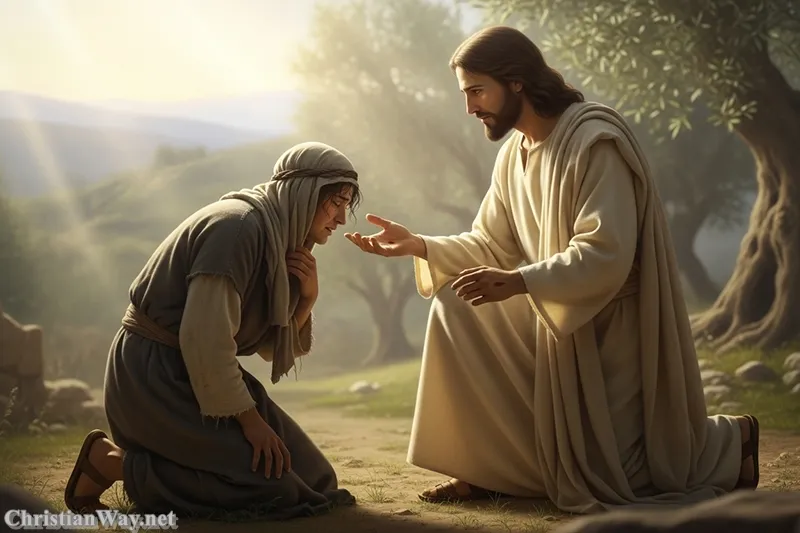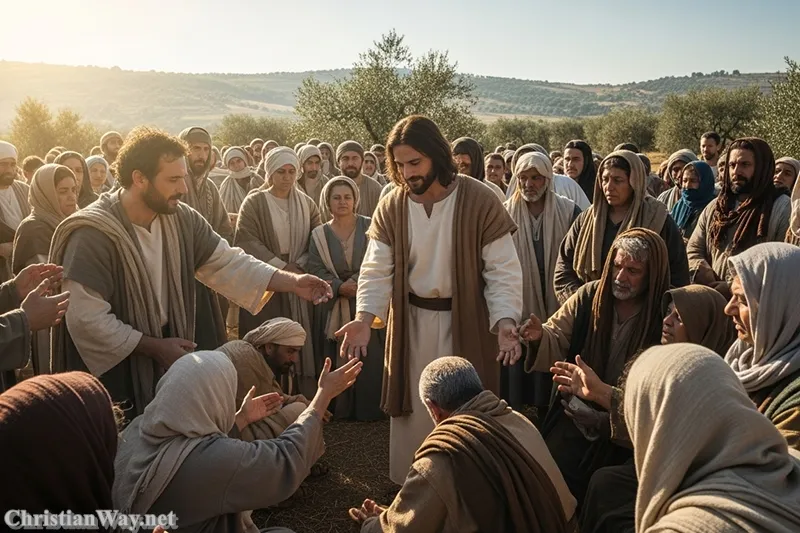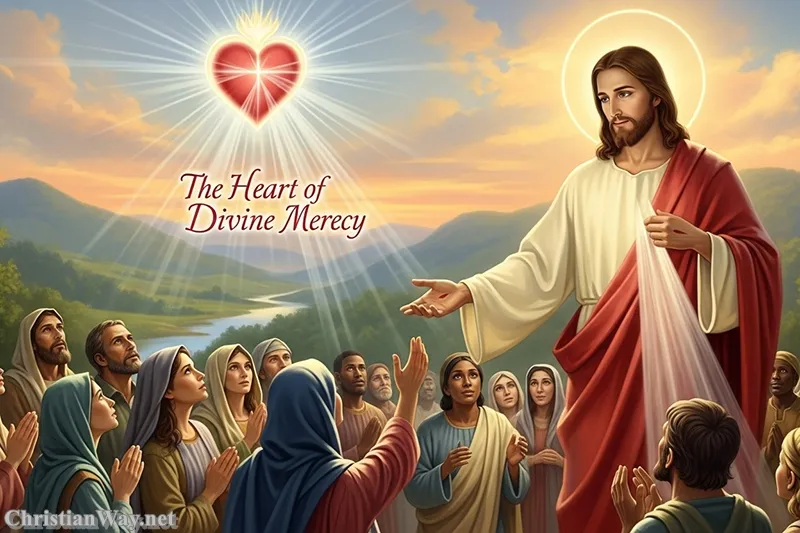Dear friends in Christ,
Every heart carries memories of moments when we have fallen short — times when our words wounded, our choices strayed, or our love grew cold. These moments can leave deep marks within us: guilt, regret, or shame that quietly follow us like shadows. Yet, in the midst of that darkness shines one of the most radiant truths of our faith: Jesus’ forgiveness.

The forgiveness of Jesus is not a passing sentiment or a divine formality. It is the living expression of His love — a mercy that sees us, knows us, and lifts us from our lowest place. To speak of Jesus’ forgiveness is to speak of the very heart of the Gospel. It is the good news that no sin is greater than His mercy, and no distance is too far for His love to reach.
The Heart of Jesus’ Forgiveness
At the center of Christian faith stands a cross — not as a symbol of defeat, but of forgiveness. From that wooden altar, Jesus spoke the words that changed the world: “Father, forgive them, for they know not what they do” (Luke 23:34).
These words are not merely addressed to those who stood beneath the cross two thousand years ago. They echo through every generation, every sin, every broken heart. In them, Jesus reveals the boundless compassion of God, who does not wait for our perfection before offering His mercy. He forgives before we even ask, and His forgiveness invites us to begin again.
Forgiveness as the Face of Divine Love
Forgiveness is not something Jesus gives apart from Himself — it is who He is. Every act of healing, every parable of mercy, every gesture of welcome to sinners reveals this truth. When He forgave the paralytic (Mark 2:5), the adulterous woman (John 8:11), and Peter who denied Him (John 21:15–19), He showed that forgiveness is the doorway to new life.
Jesus’ forgiveness does not deny our sins; it redeems them. He looks at us not as we have been, but as we are meant to be — beloved sons and daughters of God.
The Human Need for Forgiveness
In every soul, there lies a hunger for reconciliation — a desire to be made whole again. Our modern world speaks often of tolerance and self-acceptance, yet deep within, the human heart still longs for something greater: to be truly forgiven.
We can try to excuse our failures or forget our mistakes, but only the forgiveness of Jesus can reach the roots of our wounds. It heals not only the guilt of sin but also the fear that we are unworthy of love.
The Weight of Unforgiveness
To live without forgiveness is to carry a burden that grows heavier with time. It can manifest as anger, bitterness, or despair. Many souls live imprisoned by what they cannot let go — of themselves or of others. But Jesus calls gently to each of us: “Come to me, all you who labor and are burdened, and I will give you rest” (Matthew 11:28).
In His forgiveness, rest is found. In His mercy, our past no longer defines us.
The Parables of Jesus’ Forgiveness
Jesus often revealed the mystery of forgiveness through stories that reach the heart.
The Prodigal Son (Luke 15:11–32)
Perhaps no parable captures Jesus’ forgiveness more beautifully than that of the prodigal son. A young man demands his inheritance, wastes it in sin, and returns home in shame. Yet the father — representing God — runs to him, embraces him, and restores him completely.
This is how Jesus describes the love of the Father: not as a judge waiting to condemn, but as a father running to forgive. The son’s return mirrors our own journey: no matter how far we wander, Jesus’ forgiveness waits on the horizon, ready to welcome us home.
The Woman Caught in Adultery (John 8:1–11)
When a woman is brought before Jesus for judgment, the crowd demands punishment. But Jesus writes on the ground, silences the accusers, and says, “Let him who is without sin cast the first stone.” One by one, they leave. Jesus then turns to her with the gentlest of words: “Neither do I condemn you; go, and sin no more.”
Here lies the balance of divine mercy — Jesus forgives without condoning sin. His forgiveness calls us to conversion, to leave behind the darkness and walk in the light.
The Cost of Forgiveness: The Cross
Forgiveness, as divine as it is, was not without cost. The forgiveness of Jesus flows from His wounds. The nails, the thorns, the cross — all speak of a love that bore the full weight of human sin.
In His Passion, Jesus took upon Himself every sin that would ever be committed, offering His life so that ours could be redeemed. “By His wounds, we are healed” (Isaiah 53:5). The cross is not merely a reminder of suffering; it is the fountain of mercy. Every act of forgiveness that we receive today — through prayer, through confession, through grace — flows from that sacred moment on Calvary.
Receiving Jesus’ Forgiveness Today
Though two millennia separate us from the time of Christ, His forgiveness remains as near as our breath.
In Prayer
When we fall to our knees and speak from the heart — “Lord, have mercy on me, a sinner” — we step into the same mercy that forgave Peter, Mary Magdalene, and countless others. True prayer is not about eloquence, but about honesty. Jesus listens not to our words, but to our wounds.
In the Sacrament of Reconciliation
For Catholics and many other Christians, the sacrament of confession is the living continuation of Jesus’ forgiveness. When we hear the words, “I absolve you from your sins,” it is not merely a priest speaking — it is Christ Himself. He does not recall our failures but restores our dignity as children of God.
In the Daily Practice of Mercy
To receive forgiveness from Jesus is to be called to give it. The forgiven become forgivers. As He taught: “Forgive us our trespasses, as we forgive those who trespass against us.” (Matthew 6:12)
This is not optional — it is the heart of Christian life. To withhold forgiveness is to block the flow of grace within us. But to forgive others — even when it hurts — is to share in the divine love of Christ Himself.
The Transforming Power of Forgiveness
When Jesus forgives, He transforms. Those touched by His mercy are never the same.
Peter, once broken by his denial, became the rock of the Church. Mary Magdalene, once lost in sin, became the first witness to the Resurrection. The thief on the cross, forgiven in his final hour, entered Paradise. Each story is proof that Jesus’ forgiveness is stronger than our sin.
Forgiveness does not erase our history; it redeems it. The scars remain, but they become sacred — signs of grace, not shame.
Freedom in Christ
True freedom is not the ability to do whatever we want, but to live unchained from guilt and fear. When Jesus forgives us, He restores the freedom to love again, to hope again, to begin again.
His forgiveness brings peace — not as the world gives, but as only God can. It quiets the storms within the soul, turning remorse into gratitude and despair into trust.
Forgiveness as a Way of Life
To follow Jesus is to live in a rhythm of forgiveness. We must learn not only to receive it but to offer it — daily, humbly, joyfully.
Forgiving Ourselves
Many find it easier to believe that God forgives them than to forgive themselves. But if Jesus — who is perfect love — has already forgiven us, who are we to hold onto guilt He has already released?
To accept His forgiveness fully is to let go of the self-accusation that keeps us bound. When Jesus said to Peter, “Feed my sheep,” He was saying, in essence, “You are forgiven — now live as one who is free.”
Forgiving Others
Forgiveness does not always mean forgetting or condoning what was wrong. It means choosing love over resentment, peace over revenge.
When we forgive others, we imitate the heart of Jesus. We become living witnesses of His mercy in the world — ambassadors of reconciliation in a divided world.
The Joy of the Forgiven Soul
A forgiven heart is a joyful heart. It sings the psalmist’s prayer: “Bless the Lord, O my soul, and forget not all His benefits — who forgives all your iniquity, who heals all your diseases.” (Psalm 103:2–3)
This joy is quiet but unshakable. It does not depend on circumstances but on grace. It is the joy of knowing that we are loved, not because we are perfect, but because we are His.
Living in the Light of Forgiveness
Jesus’ forgiveness is not the end of our story — it is the beginning. Once forgiven, we are called to live differently: with humility, compassion, and mercy toward all.
When we forgive others, we reflect Christ’s light into a darkened world. When we forgive ourselves, we honor His cross. When we accept His forgiveness, we become vessels of divine love.
Let us, then, live each day under the radiant truth that defines our faith: We are forgiven — infinitely, freely, and forever in Jesus Christ.
Reflect and Pray
Lord Jesus,
You know the sins that wound us and the guilt that weighs us down.
You see the places where we cannot forgive ourselves or others.
Yet You call us by name and whisper, “Peace be with you.”
Teach us to trust in Your mercy more than in our mistakes.
Heal our hearts with Your forgiveness,
and make us instruments of reconciliation in Your world.
May Your love free us,
Your grace renew us,
and Your forgiveness guide us into everlasting peace.
Amen.
— Fr. John Matthew, for Christian Way





